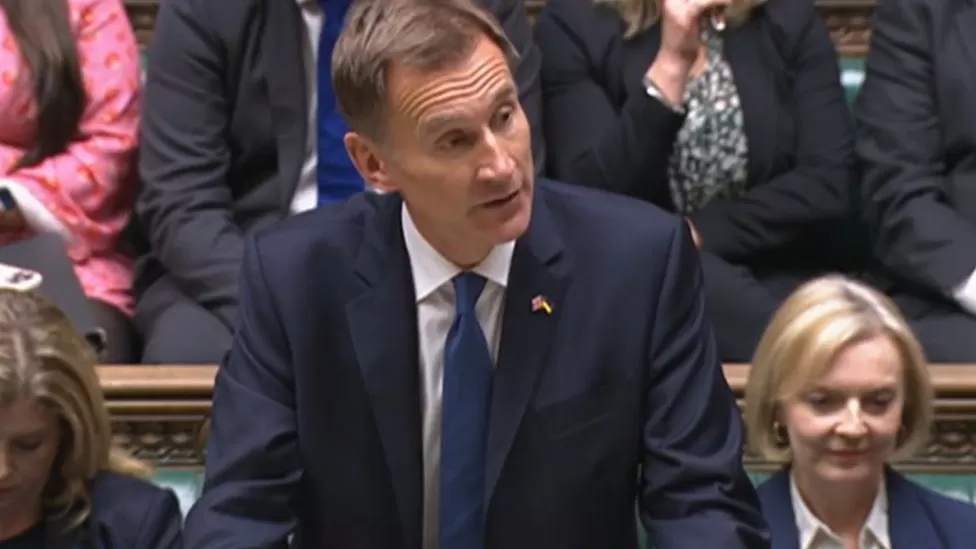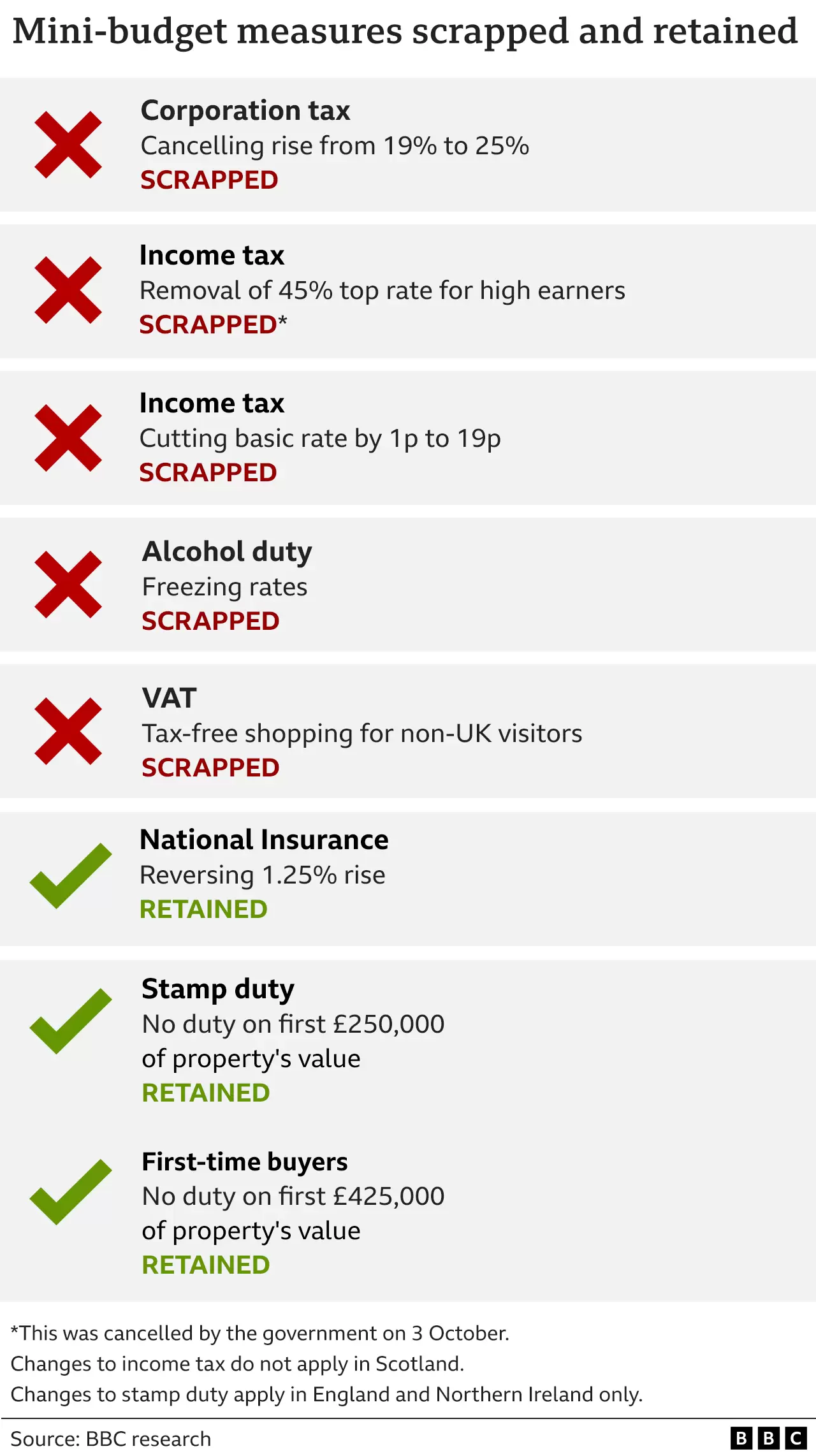Chancellor Jeremy Hunt has axed most of Liz Truss’s mini-budget, as the prime minister tries to remain in power. Mr Hunt announced he was scrapping “almost all” of the tax cuts announced by the government last month, in a bid to stabilise the financial markets. A minister had to deny Ms Truss was hiding “under a desk” after the prime minister did not attend a clash with Sir Keir Starmer in the Commons. Five of her own MPs have now called on her to resign. Many more Conservative MPs are calling on the prime minister to quit in anonymous briefings. But Ms Truss told the BBC she intends to lead the Conservatives into the next general election and apologised for making mistakes.
Other mini-budget measures to be axed include:
- Cuts to dividend tax rates
- The reversal of off-payroll working reforms introduced in 2018 and 2021
- VAT-free shopping for international tourists
- The freeze on alcohol duty rates

And the new chancellor made clear there will be cuts in public spending to come – something the prime minister said last week she was “absolutely” not planning. The government had already abandoned plans to scrap the 45p rate of income tax for top earners and had U-turned on a promise not to increase corporation tax. However, he said the cuts to stamp duty paid on house purchases and the scrapping of the National Insurance rise would continue.
The plan to remove the cap on bankers’ bonuses is another of the mini-budget policies to survive. Mr Hunt, speaking during an emergency statement in the Commons with Ms Truss behind him, said the UK “funds our promises and pays our debts”. He said, “when that is questioned – as it has been – this government will take the difficult decisions necessary to ensure there is trust and confidence in our national finances”. “That means decisions of eye-watering difficulty.” In response to the chancellor’s new strategy, financial markets – which had been spooked by the prospect of unfunded tax cuts along with emergency interventions in the energy market and the cost of Covid-19 support – appeared to calm. The pound rose and the cost of government borrowing fell.
Mr Hunt told the Commons a new Economic Advisory Council would be formed to provide independent expert advice, alongside that from the Office for Budget Responsibility. Asked if he would introduce a “proper” windfall tax on energy companies, Mr Hunt said he was “not against the principle” of taxing profits that are “genuine windfalls”, adding that “nothing is off the table”. Ms Truss had previously ruled out a further windfall tax on energy companies. Before the prime minister appeared at the chancellor’s statement, Labour leader Sir Keir Starmer accused her of “hiding away, dodging questions” at an Urgent Question in the Commons. Instead, Ms Truss sent Commons Leader Penny Mordaunt in her place for the clash.
In a series of tense exchanges, Ms Mourdant told MPs the “prime minister is not under a desk” hiding to avoid difficult decisions. She also denied there had been a “coup” to remove her. Meanwhile, Sir Charles Walker became the fifth Conservative MP to publicly call for Ms Truss to stand down. He told Sky News: “I think her position is untenable. She has put colleagues, the country, through a huge amount of unnecessary pain and upset and worry”. He joins Tory MPs Angela Richardson, Crispin Blunt, Andrew Bridgen and Jamie Wallis in openly calling for the PM to go. Many others are privately saying Ms Truss cannot remain prime minister.

Former chief whip Andrew Mitchell said the prime minister had just a fortnight to save her premiership and “if she cannot do the job, she will be replaced”. Under current Conservative Party rules, Ms Truss is safe from a no-confidence vote by Tory MPs to oust her for a year. The rules could be changed, however, sources suggested to the BBC that the 1922 committee of backbench MPs, who set the rules, would prefer the prime minister to jump before she is pushed. Before her appearance at the chancellor’s statement, the prime minister had met with 1922 Committee chairman Sir Graham Brady, who is likely to have brought up her lack of support among Tory MPs. Allies of Ms Truss have acknowledged it was a crucial 24 to 48 hours for her premiership. However, there is little agreement over who should take over from Ms Truss if she is removed. Labour said the Conservatives had “lost all credibility”.
“The chancellor said that growth requires ‘confidence and stability’ yet it’s clear that the Tories can’t provide this,” shadow chancellor Rachel Reeves said. The Liberal Democrats’ Treasury spokeswoman Sarah Olney called for a general election to ensure “stability”. SNP Treasury spokeswoman Alison Thewlis said the now virtually scrapped mini-budget had caused “huge economic pain”, adding that she was worried about suggestions of a further “tightening to purse strings”.
![]()





